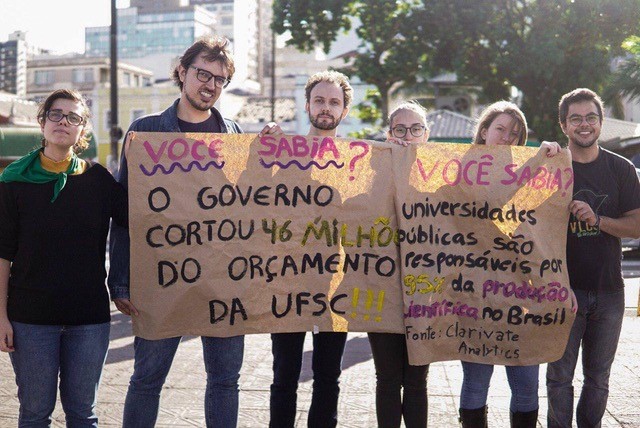You have /5 articles left.
Sign up for a free account or log in.
The declarations of the ultra-right-wing president, Jair Bolsonaro, in regard to higher education have been cause for great concern to university rectors, experts and the society at large. The concern seems to have been warranted since he has pushed his agenda during his first five months in office, increasing pressure for his reforms more recently.
Uncertainties, controversies, and pushbacks
From January to March 2019, the Ministry of Education under Ricardo Vélez Rodrígues was characterized by an “internal war” resulting in great instability and more than ten layoffs of individuals in high-level positions. Vélez Rodrígues contributed to tensions with controversial proposals including his intention to revise historical material in school textbooks relating to the Brazilian military dictatorship and a request for schools to film students singing the national anthem.
Vélez Rodrígues asserted that access to universities should not be for all, insisting, “The idea of university for all people does not exist. Universities should be reserved for an intellectual elite.” This is particularly offensive as higher education in Brazil remains a privilege of an elite: more than 50% of the population between 25 and 64 years old haven’t finished high school and only 15% of the population between 25 and 34 years old have a university degree. This attitude also contradicts recent initiatives to broaden access and democratize public higher education in the country that led to the creation of 10 new universities, the consolidation and implementation of 115 new campuses, the increase in the number of undergraduate programs by 53% and enrollments by 66%.
Humanities and public universities as main targets
In April, economist Abraham Weintraub replaced Vélez Rodrígues in the Ministry of Education. Immediately following his appointment, President Bolsonaro announced on Twitter that Minister Weintraub was studying investments in schools of philosophy and sociology toward the possibility that studies in the humanities would be offered exclusively by private institutions and indicating that the objective of public investment “is to focus on fields that generate an immediate return to the taxpayer such as: veterinary medicine, engineering, and medicine.”
This dismissal of humanities and social sciences from public institutions reflects the ideological position of the president and his hostile attitude towards public universities and academics, a threat not only to the operation of these institutions but also to academic freedom and critical thinking. There is also evidence of individual economic interests involved. The minister of economy, Paulo Guedes, has investments in the private and distance learning sectors that reach up to R$1 billion (around US$250 million) and his sister is the vice-president of the association that represents educational monopolies such as Anhanguera, Estácio, Kroton, Uninove and Pitágoras.
A month into Weintraub’s administration, he announced that three federal universities—Brasília (UnB), Fluminense (UFF) and Bahia (UFBA)—would face budget cuts for allegedly promoting turmoil and for poor academic performance. According to Weintraub, “Homework needs to be done: scientific publication, up-to-date assessments, good positions in rankings.” Ironically, these three institutions are among the best in Brazil according international rankings measuring research productivity, raising doubts about the motivations for his claims.
The cuts quickly spread to the entire federal system causing concern about the future of higher education in Brazil. All federal universities and institutes will endure a 30% cut in their 2019 budgets putting into question operational viability in the second semester. By contrast, the value of the stock of the three largest private education jumped.
Additional concern arose when CAPES (Coordination for the Improvement of Higher Education Personnel) blocked 4,798 pending grants for graduate study. Students already enrolled still received their grants but those recently selected did not. On May 9th, the rector for graduate studies at Federal University of Santa Catarina (UFSC) confirmed that CAPES had rescinded 71 new awards to graduate students of that institution.
Immediate implications for internationalization
These measures have immediate implications for initiatives to internationalize higher education. The UFSC rector for graduate studies stated that the programs for graduate study and research abroad, Doutorado Sanduíche no Exterior (PDSE) and CAPES-PrInt, were halted by CAPES, even though individuals had already been selected. PDSE funds international mobility for PhD researchers while Capes-PrInt supports internationalization at higher education institutions. The majority of the 36 institutions selected in the first selection process are public and have a solid research tradition.
The program Languages without Borders, focused on promoting foreign language capacity for the internationalization of Brazilian higher education is also threatened. The coordinator of English at the Federal University of Rio Grande do Sul (UFRGS) announced in May that the program has been suspended at that institution due to lack of public resources— while classes in progress will continue, new ones are cancelled.
Finally, the 30% budget cut in the federal system will probably affect south-south and regional cooperation. While national programs for internationalization have been mostly focused on the United States and Europe, there are important initiatives that have been financed by institutional budgets.
Truths that need to be told
To a large extent, attacks on public higher education are not substantiated in reality. The president claims that public institutions are unproductive, yet while they represent only 12.1% of the national system, they are responsible for 95% of national research productivity. But their social roles go beyond research to reach Brazilian society in many important ways. University hospitals are responsible for more than 315 thousand hospitalizations, 400 thousand surgeries and 23 million medical appointments and exams per year—for free.
Another unproven assertion is that only “leftists” and “marxists” inhabit public universities when these institutions are actually a reflection of the broader society and represent different political positions.
Finally, it is not true that only rich people go to public universities. Even though these institutions have been historically elitists, they have become more democratic in recent years. Today, 70% of undergraduate students at public institutions come from families with a monthly income up to R$1,500 (around US$ 370). There are also quotas for graduates of public high schools and minority groups that contribute to diversity and minimizes the country’s great social inequality.
Efforts of resistance


The austerity measures proposed by the president and his minister of education are not being accepted by the Brazilian public and are attracting international attention. At the international level, scholars from more than 800 institutions–including the president of the International Sociological Association–have signed an open letter against the proposal to cut public funding from philosophy and sociology. A declaration against the attack on humanities written by the Regional Platform for University Integration has also been signed by scholars and representatives at institutions worldwide. National efforts include ongoing protests organized by students at federal institutes, individual campaigns by federal higher education institutions to demonstrate their contributions to the society as well as general strike that took place on May 15th in all states of the country—more than one million people participated!
Fernanda Leal is a visiting scholar at the Center for International Higher Education (CIHE), Boston College (BC), United States, and a PhD. Candidate at the Universidade do Estado de Santa Catarina (UDESC), Brazil. She is also an executive assistant at the International Office of the Universidade Federal de Santa Catarina (UFSC), Brazil.





